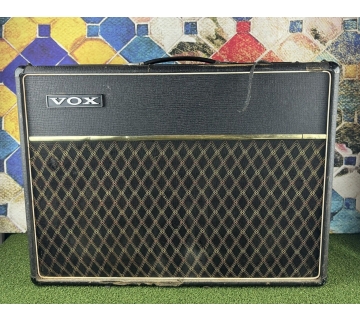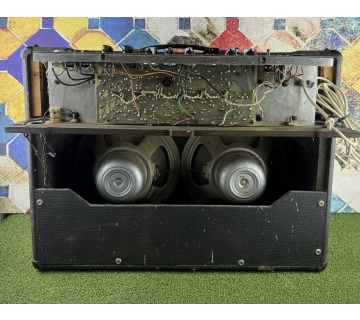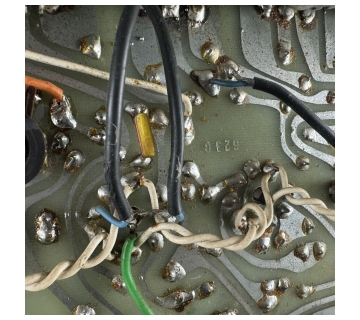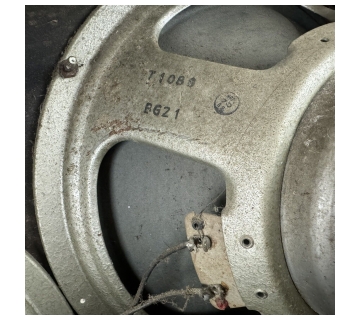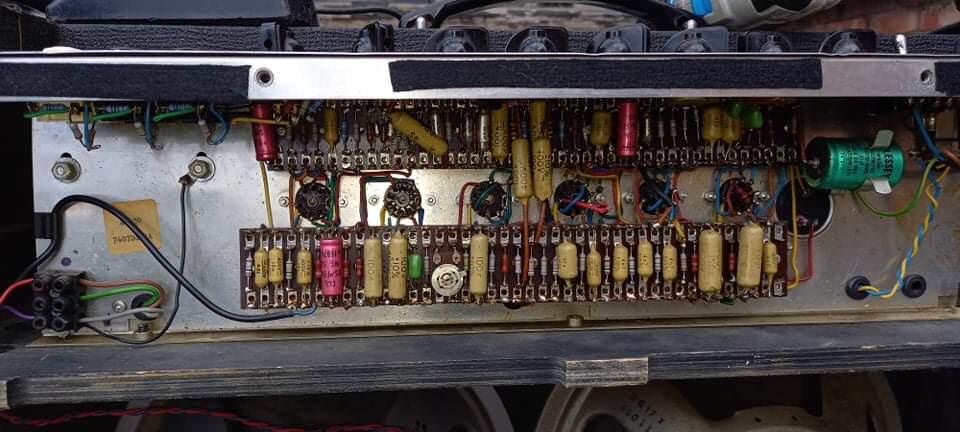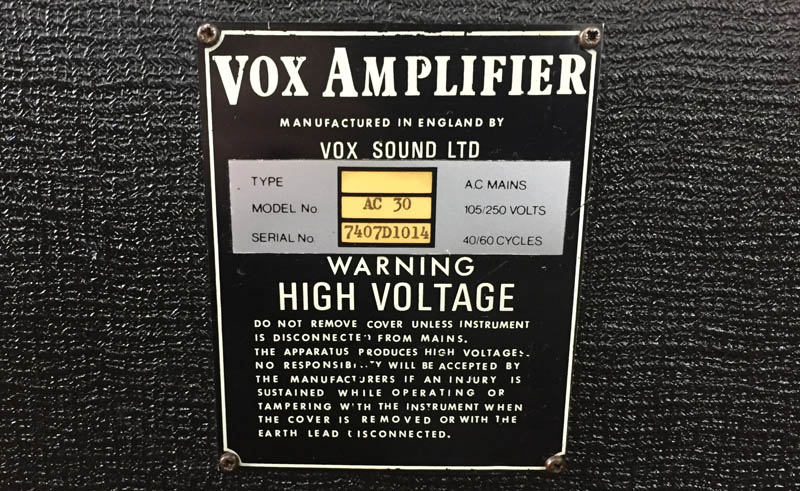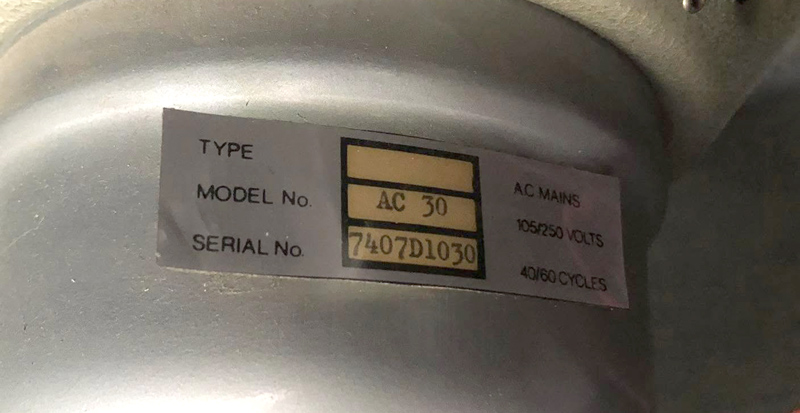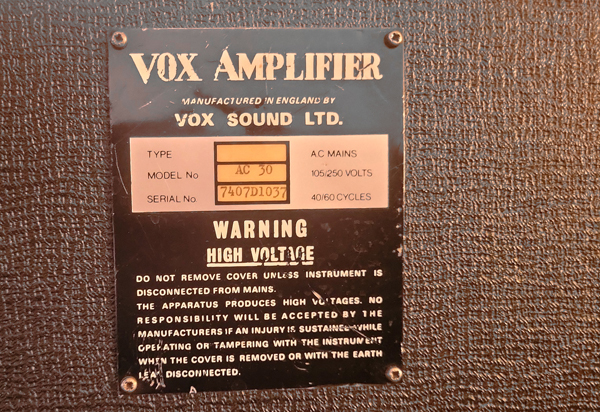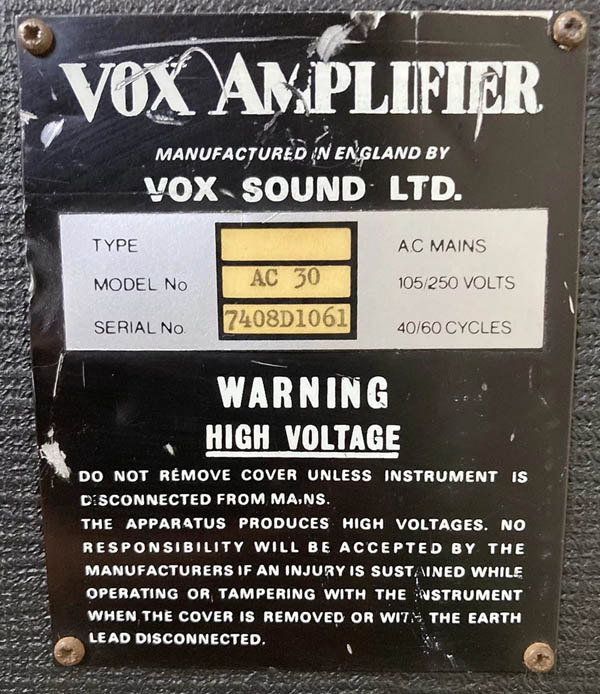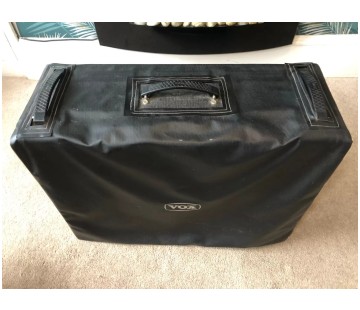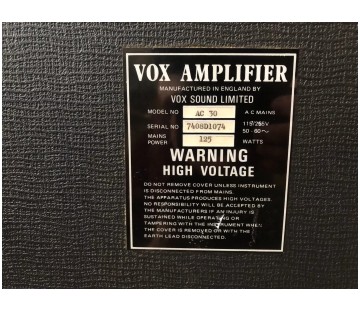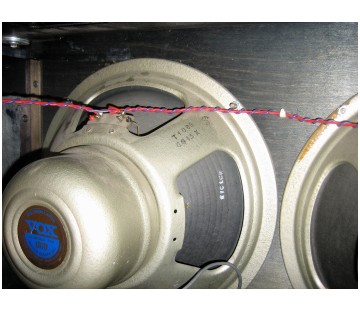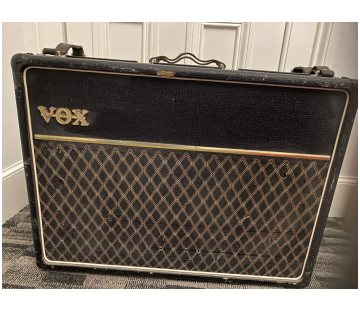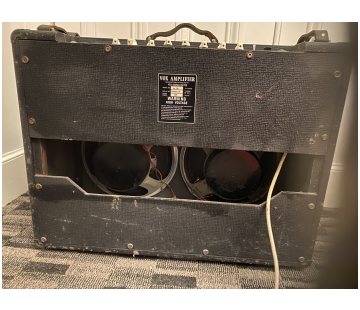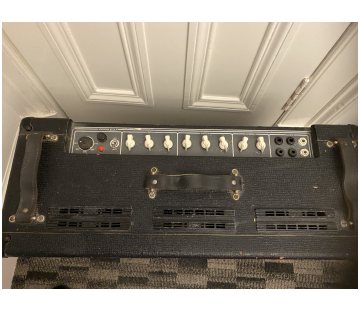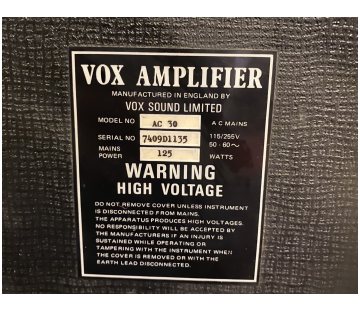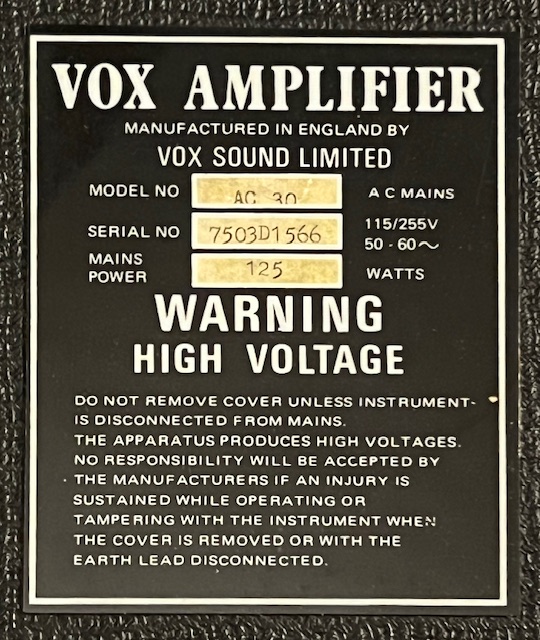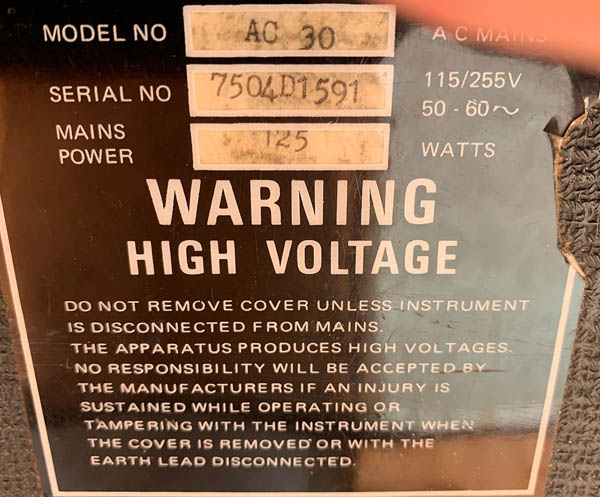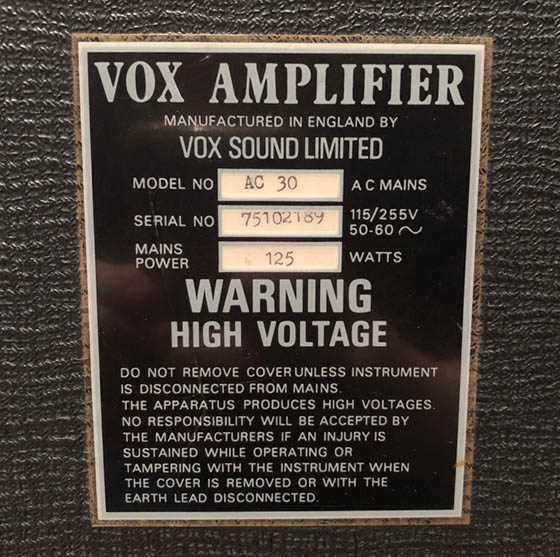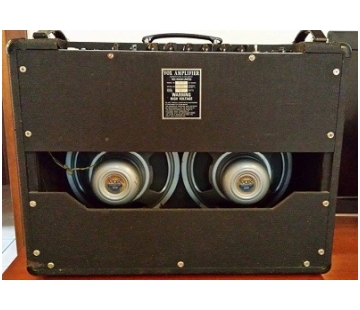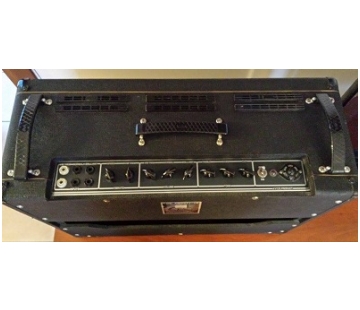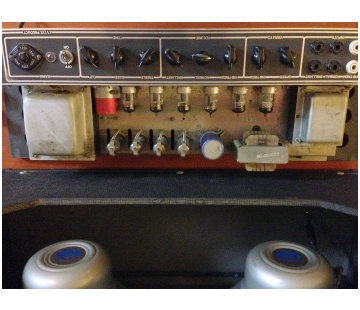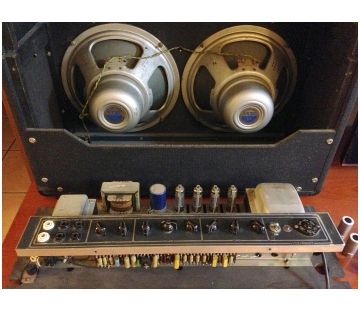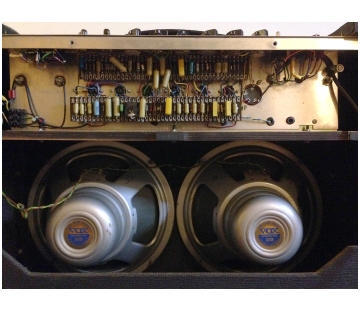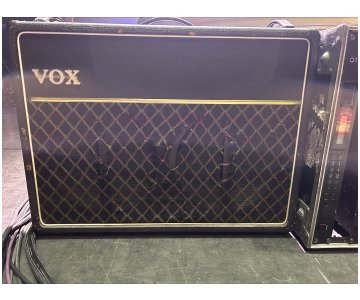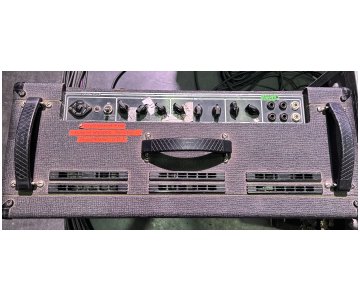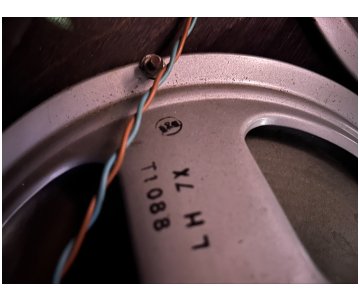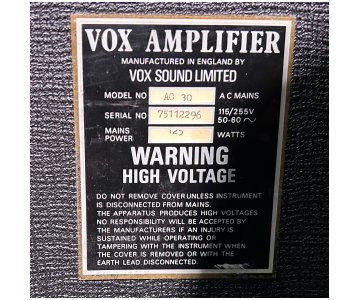Vox AC30s - 1974-1975
"Dallas Musical Limited" and "Dallas Arbiter"
Detail from the "Dallas Musical Limited" catalogue of 1974.
By early 1973, the original incarnation of "Vox Sound Limited" was finished and during the course of the year the business was wound down by George Stow, the managing director. Some of the stock that remained unsold was bought in by Stow for his new venture "Roxburgh Sound"; batches of components and unfinished items went to other former members of staff, who assembled them for sale - occasionally with mighty peculiar results.
For the first seven months of 1973 nothing of any note was said of Vox in the music trade or popular music press. The regular monthly pricelists published in "Beat Instrumental" simply indicated that the "Vox line was being rearranged, prices to be announced" - presumably to the puzzlement of readers.
Then in August 1973, the music trade press carried the report below. Dallas had come to the rescue:
August 1973
Judging by the tone of the piece, Vox was still alive at the time, but only just. Bankruptcy at any rate had not been declared. Quite how long the negotiations took is not known at present.
Dallas's acquisition was in some senses well timed as certain items of Vox equipment could be shown at the Russell Hotel Trade Fair (late August '73). "Vox Sound Limited" had been in too poor a condition to go to the Frankfurt Fair in February.
Russell Hotel Trade Fair, late August 1973. A rough shot showing Vox in a sort of mix and match section of the Dallas display. One can make out a perspex AC30 in the foreground, and production amps further back, along with some pedals.
Behind the scenes, Reg Clark, former General Sales Manager of JMI, now the General Sales Manager of Dallas, had worked his magic. "Beat Instrumental" magazine published the news in October. This was the second time that Reg had saved Vox, the first being in 1968, following the collapse of JMI. 1973 might have been a third had Reg been successful in steering Dallas to take up the reins of "Vox Sound Equipment Limited", which had also gone to the wall, in early January 1970.
"Beat Instrumental" magazine, October 1973.
In late 1973, the company was still "Dallas Arbiter" - or just about. The comings and goings of CBS, Dallas, and Ivor Arbiter were incredibly complex in the first half of the 1970s. In January 1974 however, the business became (for a time at least) "Dallas Musical Limited" (John E. Dallas), sometimes known as "Dallas Musical Industries".
The company's main drive was to move production of all its lines to its factory at Shoeburyness in Essex. This was a new build, begun in April 1973 and complete by April 1974. Dallas began moving in in May 1974. Under the building's extensive roof "Sound City" and "Vox Sound Limited" amplifiers, "Hayman guitars", and numerous other brands were manufactured.
Assembly of new AC30s was evidently put in motion in the summer of '74 - in good time for the BMII Trade Fair in July 1974.
Dallas Musical Industries, Shoeburyness factory, Essex.
It is interesting to find that Tom Jennings, who had become dissatisfied with "Jennings Electronic Industries", the company he had created following his dismissal from JMI in 1967, joined Reg Clark at the new "Vox Sound Limited" as Managing Director in July 1974 - presumably at Reg's request.
July 1974. Note the last sentence.
November 1974. Advert placed by Reg.
Unfortunately Dallas collapsed in early 1975, having overspent on its new manufacturing facility at Shoeburyness. CBS Arbiter stepped in to save the company but Tom was out. He retired thereafter from the music business for good.
"British Musical Instrument Industries" Fair, Metropole Hotel, Brighton, July 1974 - no shot of the stand itself, simply the name - VOX - over the entrance. In 1975 the BMII Fair returned to the Russell Hotel in London, its traditional venue.
Insofar as the initial deal was concerned, unsold AC30s assembled by "Vox Sound Limited" in Hastings apparently formed part of the package as one might expect. At least one Hastings inspection tag survives later stamped "DMI" = "Dallas Musical Industries".
An inspection tag from the old VSL works on the Ponswood Road Industrial Estate in Hastings stamped "DMI" = Dallas Musical Industries.
In June 1974 a new circuit diagram for the AC30 Top Boost was drawn up, the principal change being the deletion of the GZ34 rectifier valve and introduction of silicon diodes to take its place. A little more volume was thereby gained.
Speakers for the most part are silver Celestion alnico T1088s, though some Celestion G12s with VOX labels are found early on. The T1088s have labels resembling the old JMI labels, but giving the company as "V.S.L." and the address: Elm Road, Vanguard Way, Shoeburyness, Essex.
Stories are reported of 50 sets of older speakers - from "Vox Sound Limited" days (1970-1973) or perhaps even earlier - being used in the first amps. This may be true, and it is possible that the date codes will bear the reports out. But the mere presence of T1088s in a Dallas-made amp does not mean it is one of the first fifty. Dallas produced hundreds of amps with T1088 speakers - examples can be seen below.
Quite how many AC30s "Dallas Musical Limited" sold is unknown - probably 300-400. In early 1975 the company folded, and was saved by CBS-Arbiter, becoming "Dallas Arbiter" again. That at least was how it was conventionally known. Reg Clark, again, was instrumental in saving the Vox line.
"International Musician and Recording World", May 1975.
Further material on Dallas Arbiter to come.
1974
"Beat Instrumental" magazine, May 1974.
Detail from the "Bell Musical Instruments" (Surbiton) catalogue, 1974/1975.
In the advert above, note the long horizontal logo and vents - typical of the amps made in the Birch-Stolec factory in Hastings. See this page. It is likely that some of the earliest amps issued by Dallas were simply unsold VSL stock.
Surviving amps (in progress)
Status unknown
An interesting AC30 that emerged in 2024: solid state rectified; printed circuit board construction (not of the Birch-Stolec type); T1088s dated 21st February and 10th April 1974; no serial number plate. The cabinet has three plastic vents on top (as some "Vox Sound Limited" cabs from 1972), and a single central handle only, no holes in the vinyl for side handles.
In terms of general date, the amp seems to sit between the acquisition of "Vox Sound Limited" by Dallas in the late summer of 1973 and new factory production (at Shoeburyness) in the late summmer of 1974. The only date codes known at present are those of the speakers (ie. nothing of the electronics).
As things stand, the amp is either likely to be early Dallas production, or part of a run made by someone else from left-over "Vox Sound Limited" materials. Whatever the case - and it would be good to determine which - the services of a professional PCB maker were evidently sought.
A page on the AC50s knocked up by a group of fly-by-night boys in South-East London following the collapse of JMI can be found here.
1974 (production)
Dallas initially used old "Vox Sound Limited" serial number plates - from 1970-1973 and for entirely different models - the information panels covered over with new sticky labels. Serial numbers in 1974 begin "74". The next two numbers are the month (09, 10, and so on). "D" stands for "Dallas". The serial number of the amp follows, the sequence beginning at 1000.
Details were generally typed onto the labels. Now and again in 1975 (see below) one finds details scratched on or hand written.
Serial number 1014
Preamp.
July 1974. In good order all round. The date codes of the speakers are unknown at present.
Serial number 1030
July 1974. The serial number sticker, removed from the serial number plate, now on one of the speakers. The plate was originally made for Vox Midas 50 serial number 1006. The speakers have the date code "GG16" = 16th July 1974.
Serial number 1037
July 1974. The speakers have the date code "GG18" = 18th July 1974.
Serial number 1061
Dallas Arbiter AC30, serial number 1061, ready for sale in August 1974 (7408). The latest visible date code in the preamp is a Plessey capacitor, 21st week of 1974. The plate itself is an old "Vox Sound Limited" plate (from late 1972 / early 1973), its central section adjusted by Dallas.
The last of the plates used by "Vox Sound Limited" as it stood in 1972 can be seen towards the end of this page.
Late 2024 - unfortunately broken up, chassis, speakers, and cabinet (with serial number plate) sold off separately.
A new style of plate from this point
Serial number 1074
Number 7408D1074 - August 1974. Probably the original cover.
Serial number 1111
Number 7409D1111 - September 1974. The speakers have the date code "GG15" = 15th July 1974. The cones have "RIC 1CR" codes. Further pictures to follow.
Serial number 1135
"Dallas Musical Limited" AC30 serial number 7409D1135 - September 1974. Thanks to Colin for the pictures.
NEW
Serial number 1156
Number 7409D1156 - September 1974. External shots only. A Top Boost sized cut-out in the lower back board.
NEW
Serial number 1183
Number 7409D1183 - September 1974.
Serial number 1299 - currently in the UK
Number 7410D1299 - October 1974. Note that the chassis has a dome voltage selector (as used by JMI, VSEL and VSL). The cabinet still has six metal vents.
NEW
Serial number 1481
Number 7412D1481 - December 1974.
NEW
Serial number 1515
Number 7412D1515 - December 1974. Exterior shots only for the moment. Speakers replaced with Fanes, perhaps early on.
NEW
Serial number 1535
Number 7412D1535 - December 1974. Exterior shots only for the moment. Date codes of speakers / components unknown.
1975
"International Musician and Recording World", March 1975. The price shortly before "Dallas Musical Limited" went under.
Serial numbers beginning with "75". Plates often have wider margins. The silver Celestion T1088s also generally have 1975 date codes. Towards the end of the year a new system of serial numbers was adopted.
Serial number 1566
Number 7503D1566 - March 1975. Thanks to David for the photo.
Serial number 1591
Number 7504D1591 - April 1975. At least one of the pots has the date code "75 14" = 14th week of 1975 for its manufacture.
NEW
Serial number 1655
Number 7505D1655 - May 1975. The original VSL warranty documentation survives. The Celestion T1088s have the date code "DH2" = 2nd April 1975 for their manufacture.
From this point the "D" (for "Dallas") is dropped from the serial number sequence
NEW
Serial number 1715
Number 75071715 - July 1975. No component or speaker date codes known at present.
NEW
Serial number 1718
Number 75071718 - July 1975. As above, no component or speaker date codes known at present.
Serial number 2003
Number 7509D2003 - September 1975. Details on the serial plate scratched into the bare aluminium. One of the Mullard mustard capacitors has the date code "C4N" = third quarter of 1974. Both silver Celestions have the date code "LH7" = 7th November 1975.
Serial number 2189
Number 75102189 - October 1975. The Celestion T1088s have date codes "KH24" and "KH30", respectively 24th and 30th October 1975 for their manufacture.
Serial number 2208
Number 75102208 - October 1975. New-style voltage selector. The cabinet still has six metal vents. The Celestion T1088s have the date code "KH22" = 22nd October 1975.
Serial number 2232
Number 75112232 - November 1975. The speakers have the date code "LH5" = 5th November 1975 for their manufacture. Thanks to Massimiliano for the pictures.
NEW
Serial number 2296
75112296 - November 1975. Still in excellent working order. Speakers dated "LH7" = 7th November 1975 for their manufacture. Thanks to Colin for the pictures.
NEW
Serial number 2326
75112326 - November 1975. Exterior shots only for the moment.
Serial number unknown
Pictures from the early days of ebay. Note the horizontal VOX logo (as in the "Bell Musical Instruments" advert above); and the dome voltage selector. Speakers are Celestion "creambacks", as used, though not exclusively, in Marshall speaker cabinets in the 1970s. Due to the smallness of the images, the serial number is unreadable unfortunately.
Late 1975 / early 1976 - new serial number format and sequence
It may be the new sequence simply continued from where the old one left off, using only the last four digits.
Serial number 2511
A hand-written serial number plate. One of the Mullard mustard capacitors has the date code "B3S" = second quarter of 1973. The T1088s have "LH27" and "MH2" = 27th November and 2nd December 1975 respectively. The transformer set is 7957-7959 Thanks to Paul for the pictures.
1976
Serial number 3366














